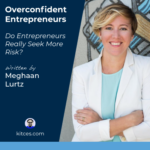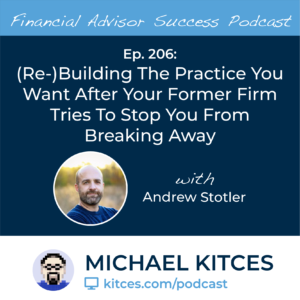While entrepreneurs are often renowned and celebrated for their willingness to take risks – to the point that encouraging someone to “be more entrepreneurial” is an analogy for taking more risks – the reality is that research shows entrepreneurs often consider themselves otherwise. From the entrepreneur’s perspective, though, what they do doesn’t necessarily seem risky – at least to themselves – because of the confidence they have in their own abilities (i.e., a belief that they will be able to navigate whatever challenges arise). Yet if entrepreneurs aren’t actually necessarily risk-takers – just very confident, or perhaps even overconfident – the question arises: what’s the best way to counsel an entrepreneur through the risks of their financial decisions if they don’t recognize those risks in the first place?
The large scope of what it actually means to be an ‘entrepreneur’ (e.g., from a goat farmer in a tiny third-world-country village to a solo divorce attorney in a large metropolitan city), and the variability in risk tolerance measurement methodologies that are used to evaluate them, makes it difficult to definitively substantiate the idea that entrepreneurs, by nature, are high-risk seekers. As some studies suggest, entrepreneurs do not necessarily take on more risk than non-entrepreneurs; rather, they may simply have a relatively high confidence (often to the point of overconfidence) level in their own capabilities… such that they don’t perceive what they’re doing to be risky in the first place. For financial advisors, this means that for some of their clients who are business owners (and for some advisors themselves!), the challenge may not be so much about dealing with high risk-takers, but instead about how to work with clients who can be overconfident (and fail to recognize the risks they actually are taking).
In turn, there are three aspects of overconfidence: overestimation (when someone believes they are better at something they actually are), overplacement (when someone believes they are better than a targeted person or group, even though they are not), and overprecision (when someone believes their expertise or ability is based on facts or past experiences, but the facts and/or experiences have been incorrectly recalled). And while exaggeration of any of these facets of overconfidence can lead to potentially disastrous results, attenuating the overexpression of these behaviors can actually be beneficial for individuals facing difficult challenges.
Financial advisors can help overconfident clients by ensuring their clients understand their financial situation clearly and accurately. This reduces the risk of clients taking action on wrong information, and can help ensure that the client has a clear understanding of ‘normal’ parameters pertinent to their financial situation, whether that relates to a business venture or simply a personal checking account balance.
Another tool that the advisor can use to help clients recalibrate potentially skewed (i.e., overconfident) beliefs they may have about their own abilities or resources is an adaptation of Subjective Probability Interval Estimates (SPIES), a methodology developed by psychology researchers to study overconfidence. By helping the client identify all possible outcomes of a decision being considered, advisors can help the client gain a clear, objective perspective of accurate and realistic information.
Ultimately, the key point is that financial advisors working with entrepreneurial clients shouldn’t necessarily assume that they are risk-takers, and instead recognize that their confidence (or overconfidence) may instead be blinding them to their risks. Yet at the same time, advisors with overconfident clients don’t necessarily need to encourage these clients to abandon their overconfidence (which really can help them to overcome the real-world daunting challenges of entrepreneurship). Instead, presenting clients with enough knowledge to help them understand how the actual risks they may be facing can impact their situation (and how those risks may pose very real threats to them, which can arise through the actions of other, potentially less skilled/knowledgeable individuals over whom the client has no control – no matter how lucky they may feel) can be the cornerstone for creating a sound financial plan, that still takes prudent risks… but with all the appropriate safeguards in place!











